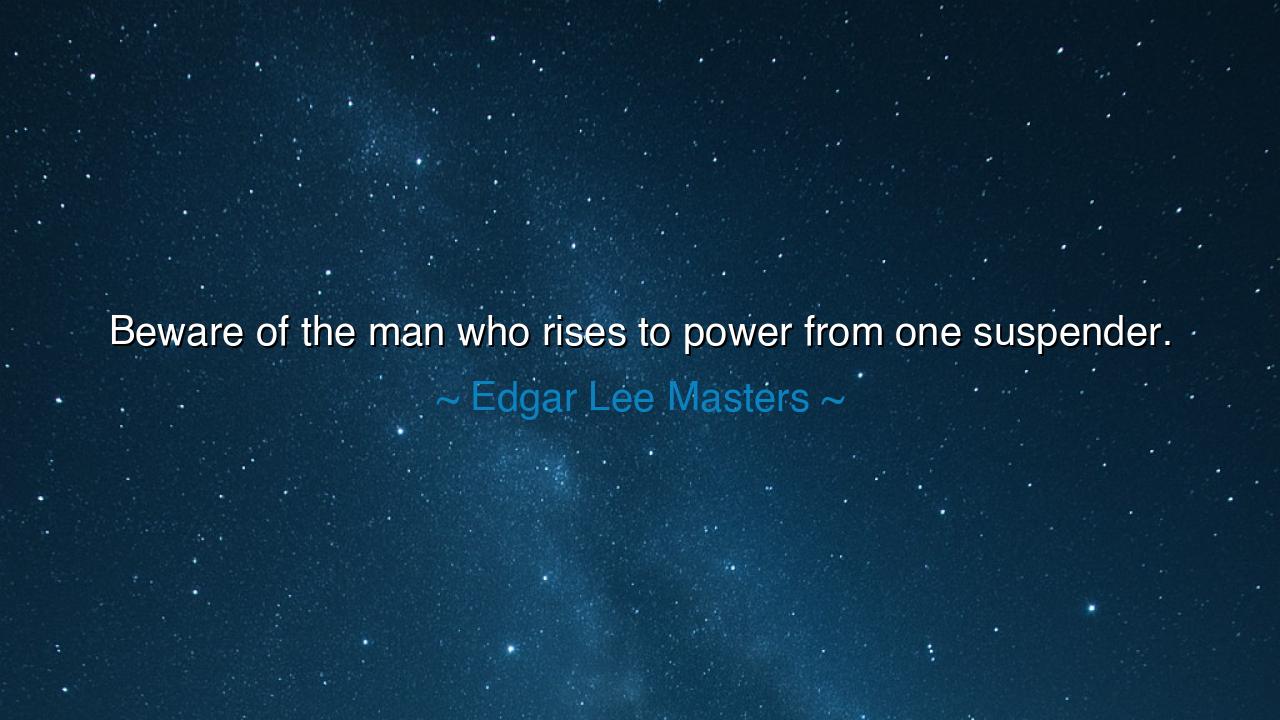
Beware of the man who rises to power from one suspender.






The words of Edgar Lee Masters, cloaked in rustic imagery, resound with sharp warning: “Beware of the man who rises to power from one suspender.” In this strange yet vivid picture, Masters speaks not of clothing but of character. The man of one suspender is one who begins with little, even nothing, yet climbs swiftly to influence. Such a rise may dazzle the world, but hidden within it is danger, for ambition untempered by humility can become a force of cunning and corruption.
The suspender, plain and humble, is a symbol of poverty and simplicity. To rise from it is no sin—for many noble men have come from lowly beginnings. But Masters warns us to beware when a man’s ascent is not matched by the growth of his virtue. For power earned without the balance of character often breeds arrogance, bitterness, or ruthless grasping. The man who remembers only his hunger for power, but not the lessons of humility, may become a tyrant in disguise.
History is filled with such cautionary tales. Napoleon Bonaparte, a soldier of little means from Corsica, rose to command the armies of France. At first his genius seemed the triumph of merit over privilege, but ambition consumed him, and he crowned himself emperor, bringing ruin upon Europe. By contrast, Abraham Lincoln too rose from humble origins, yet he carried his poverty as a teacher of empathy and justice. Both men climbed from “one suspender,” but the measure of their character marked the difference between tyranny and greatness.
Masters’ warning is not to despise the lowly, but to examine closely the spirit of those who ascend. Some who begin with little remain mindful of justice, using their position to serve others. Others, hardened by resentment, use power only to feed their pride. The single suspender thus becomes a symbol not only of poverty, but of the peril that arises when ambition outpaces virtue.
Therefore, let this wisdom endure: do not be blinded by the charm of success or the romance of the self-made man. Look instead at how he wields his power—whether to uplift or to oppress, to heal or to dominate. For the man who rises from one suspender may become either the noblest of leaders or the most dangerous of tyrants. And it is for the discerning to know the difference, lest they fall prey to the glitter of ambition that hides the rot of the soul.






NYPham Huynh Nhu Yen
There’s a biting irony here that feels timeless. Maybe Masters is pointing out how those who claw their way up from nothing often fear losing everything—and that fear drives them to dangerous extremes. It makes me think about modern politics and how populist figures often exploit their humble origins to gain trust, then betray it. Is Masters’ warning more about psychology than social status?
TKDoan Thai Khang
I find this quote darkly humorous but also unsettling. It paints a vivid image of someone clinging to power with the same stubbornness that got them there. I wonder—does Masters mean that such a person lacks balance, rising through sheer will but without wisdom? Perhaps it’s a critique of people who let their ambition outrun their humanity. Still, I’d like to know what inspired this specific warning.
NTVo Thuy Nhi Tu
This phrase feels almost metaphorical, like it’s less about suspenders and more about character. Maybe it’s warning us to be cautious of those who overcompensate for humble beginnings with ego or vengeance. But isn’t it also unfair to assume ambition corrupts? Some of the greatest leaders in history came from nothing. So where’s the line between admirable determination and dangerous pride?
TTThai Truong
I can’t help but interpret this as a social commentary on class and ambition. Perhaps Masters is saying that when someone rises from poverty to power, the memory of struggle can turn into resentment or insecurity. Could that be why such individuals sometimes rule with cruelty—to prove they belong? It raises a complex question: does hardship humble people or harden them?
DPDao Phan
There’s something cryptic but sharp about this line. It makes me think about how some leaders use their rags-to-riches story as justification for arrogance or control. Maybe Masters is hinting that those who rise too fast or too far can become intoxicated by their own success. But then again, isn’t perseverance something to admire? I’m torn between seeing this as cynicism or as a wise caution.